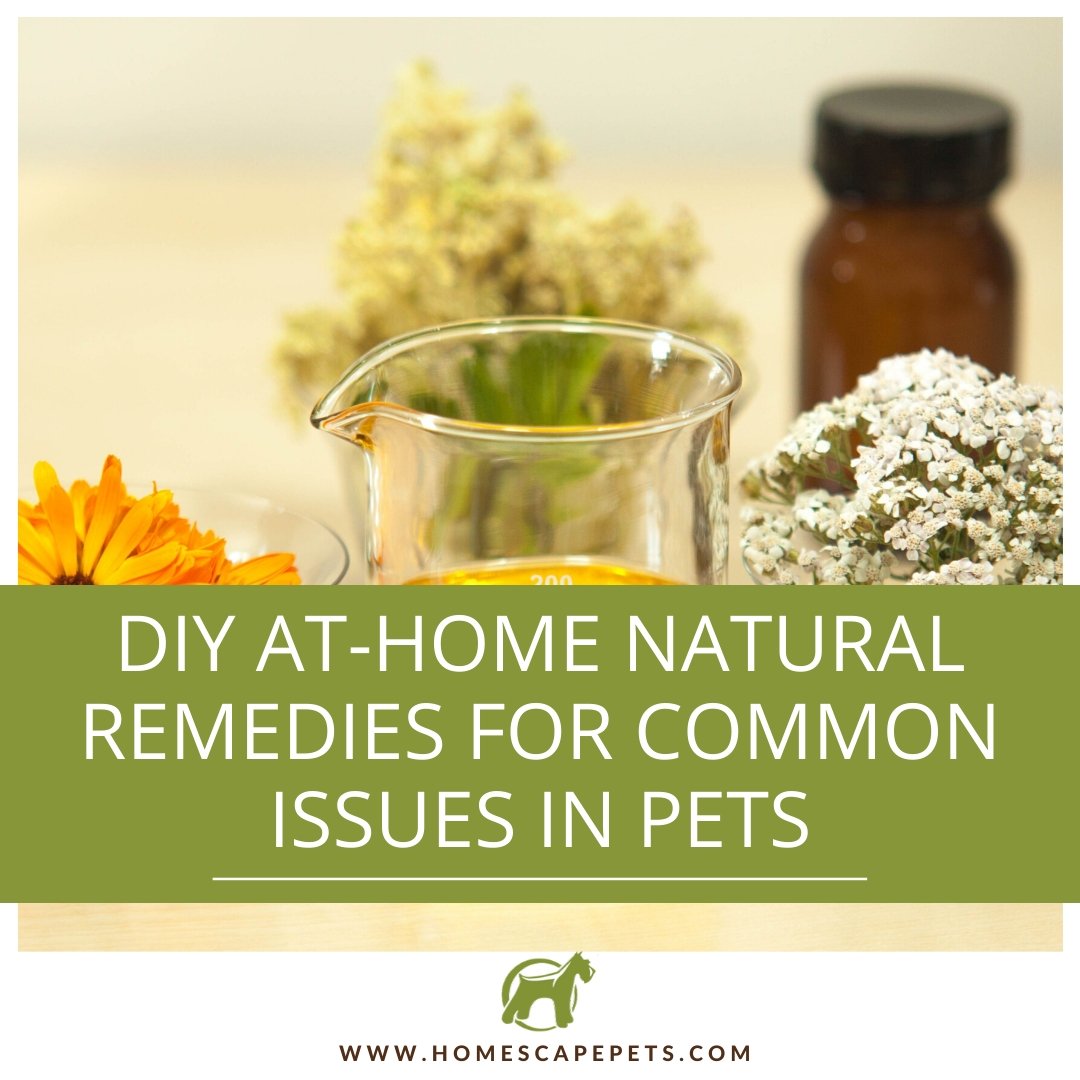
DIY At-Home Natural Remedies for Common Issues in Pets
Share
At-home natural remedies are increasing in popularity, and not just because they offer such great results. With over-the-counter medication and vet visits, the bills can add up! And what some pet parents may not think about is all that goes into those expenditures: the global consequences of manufacturing products that are more than likely made up of synthetic and toxic materials. It’s no wonder people are more and more invested in learning how to “do it themselves!”
As pet parents, it sometimes feels like we would do just about anything to alleviate any signs of pain or discomfort in our pets. But at Homescape Pets, we want you to know that resolving pesky pet issues doesn’t have to (and shouldn’t) come with other high costs and health-related risks (we’ve been there ourselves).

So, here are our DIY at-home natural remedies for common issues in pets:
- Irritated Paws
Excessive paw licking or chewing is never a good sign. And if you’ve already tried everything (medications, different diets, etc.) to resolve his or her irritated paws to no avail, then you know how sad and frustrating it is to watch your pets continue to struggle.
For irritated paws, try this simple D.I.Y. salve:
- 2 Tbsps. Beeswax
- 2 Tbsps. Coconut Oil
- 2 Tbsps. Shea Butter
- 2 Drops of Lavender Oil
Melt these ingredients in a small bowl or ramekin, wait for it to cool, and voila! Apply liberally to your poor pet’s irritated paws without fearing ingestion.
Between applications, you can also try mixing baking soda in a bowl of warm water to soak your cat or dog’s paws for a couple of minutes. Especially if there are allergens afoot, the baking soda will help clean their feet and relieve the itching (be sure to rinse well).
- Flea & Tick Problems
Is there anything more frightening than finding a flea or tick in your pet’s fur? Fleas are particularly stressful, posing a real threat to your pet and the rest of your household.
Making your own flea and tick repellent is a clean and efficient way of kicking those critters to the curb:
- In a spray bottle, combine 5 drops of Cedarwood Oil, Neem Oil, and Citronella with 2 Tsps. of Carrier Oil (Almond or Coconut).
- Dilute the mixture by filling the rest of the bottle with water and apply it to your pet’s fur.
Another pro-tip? Fleas hate all things citrus! Your kitty might not like it, but your pets will thank you later when you make them a little less appealing to fleas by rubbing just a little bit of fresh orange or lemon juice to their fur, or adding some citrus scent to your home.
To aid in securing your home against pests, sprinkle Diatomaceous Earth around your yard, house, and directly on your pet—it’s safe for them too!
- Ear Infections
If you’ve ever experienced an ear infection yourself, you know how painful it can be. Unfortunately, pets can experience allergic reactions to different foods or medicines that can result in ear infections, too.
Apple cider vinegar has a wide variety of uses, and treating ear infections is one of them. Vinegar is both an antiseptic wash and an anti-inflammatory component to treating pain. Spraying an apple cider vinegar and water mixture may just do the trick! Witch hazel is useful, too, in being a natural astringent and ear-cleaner.
Remember to apply a warm compress to his or her infected ear throughout the day and in between applications to help relieve pain and inflammation. To prevent further infections, be sure to give your pets a vitamin C boost, which will also help promote immune health.
- Hot Spots
Hot spots, or acute moist dermatitis, are especially common in pets. Your pet may develop hot spots due to allergies, fleas, small injuries, or from simply licking or scratching the same area over a sustained period of time. This can lead to painful sores, inflammation, or in worse cases, infection. In the more aggressive instances, you will definitely want to take your cat or pup to the vet.
But if you manage to catch a budding hot spot early on, here’s one way to address the issue: steep a black teabag in boiling water. After letting it cool completely, you can gently press your teabag against his hot spot several times a day.
Calendula is also an excellent herbal remedy for painful skin irritations and can come in a variety of forms like creams, salves, and even teas. To make your own calendula remedy, try mixing a cup of filtered water and a pinch of salt with several healthy drops of a calendula tincture. Apply with a clean cloth or cotton ball to the hot spot up to four times a day to reduce inflammation, alleviate pain, and promote healing. The best part is, it’s safe for your pup to ingest! Just make sure that any tincture you purchase is alcohol-free.
At Homescape Pets, we’re proud to offer our pets (and yours!) safe and natural alternatives to medications that can so often add to their distress. Adding a dose of our Calming Relief Hemp and Turmeric Oil to any of these remedies can help calm the discomfort associated with the common skin and ear irritations that come with being a pet.
What’re you waiting for!? Visit our shop, today (pssst...We’re also on Amazon).

1 comment
Is the hemp and tumeric oil to be given internally or applied externally?